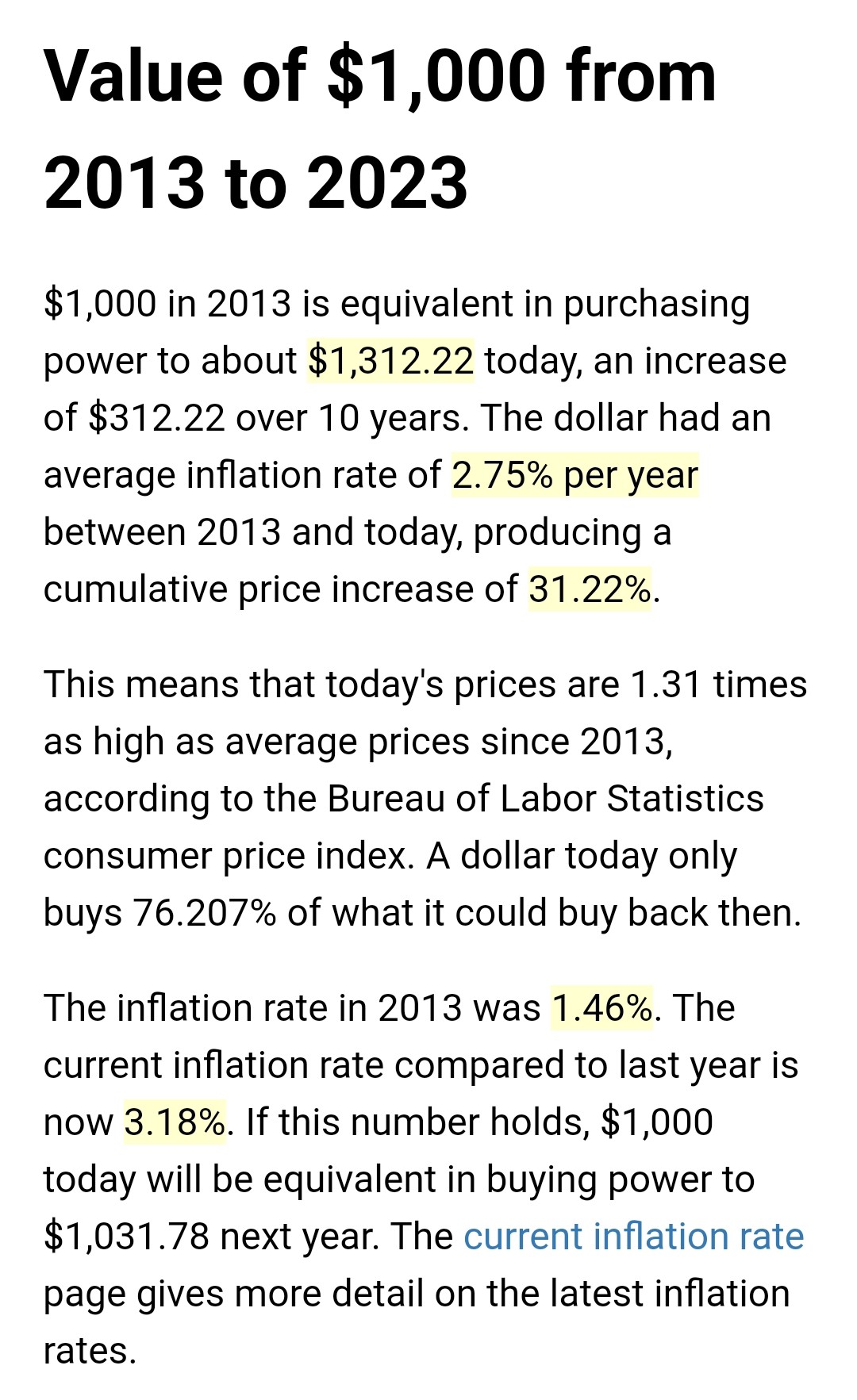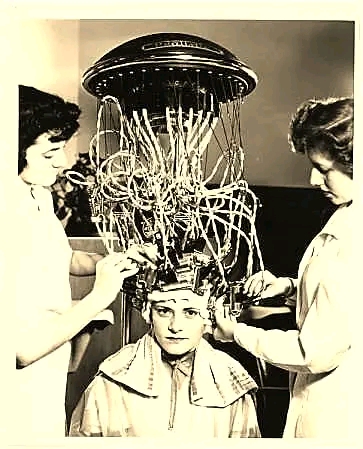I’m sure if Bitcoin had the largest and most powerful military in the world it would have become the world reserve currency by now
Alright who wants to start a new country with me
How many defense contractor CEOs owe you sexual favors?
Umm, I’m pretty sure I owe them sexual favors
Depends, will you have free market bears or communist big goverment animal control telling us how to secure our trash? /s
No because currency with built-in deflation is a bad idea. It would get scrapped very quickly.
Yes sir. Wouldn’t want regular folks to be able to retain the value of their savings! Government’s restricted to being fiscally responsible instead of printing their way out of problems with the hidden tax on the poor that is inflation? Ridiculous!
Read about the great depression or the deflationary economics in Germany right before the Nazis took power. Deflation sucks, we already experienced it and we don’t need to try it out again.
Oof, that’s not how economics works.
Inflation is good so long as wages are rising with it. It’s killing us right now because wages are stagnating hard right now.
That’s a feature not a bug.
Bitcoin: 4.7% believed to be in the hands of a single person, another 3.1% in the hands of four addresses. Deflatory so no incentive to use it to make transactions. Value depends on the network effect (i.e. a pyramid scheme). Small transactions now too expensive to be realistic. 24% of the supply was created in the first year, 35% over two years. Movement of funds takes too long to be useful. Those who got in early are guaranteed to be richer than those who got in late without having made any effort…
Crypto would be great as a replacement of the stockmarket but it’s fighting to be cash instead and it’s doing a bad job of it because it’s cash as envisioned by tech bros, not actual economists.
Also wastes energy and hardware (which includes rare earth metals mined by slaves) to endlessly compute hashes. Great solution for a post climate change world let me tell ya!
Since nobody else responded to the stock market argument: it’s how cash is envisioned to work by Austrian school economists, not the economists currently in charge. The average person needing to trust strangers with their money is not good.
It’s an entirely different perspective on how money should work (that was de facto illegal for decades), and only now can we put our money where our mouths are.
I’m not pro crypto per-se, but your argument is only valid for bitcoin, not crypto. Most of it is even worse to be fair, but there is a future for sane crypto IMO.
I love posts like this, it lets me know most people still don’t have the first clue what they’re talking about. It’s honestly a bit impressive how nearly every point you tried to make is either misleading or straight up wrong.
I love posts like this, it lets me know most crypto lovers don’t have the first clue what they’re investing in. It’s honestly a bit impressive how you didn’t even try to actually argue against what I said because it’s just a list of facts.
Lol, you want me to spell it out for you dumb-dumb? Ok
4.7% believed to be in the hands of a single person,
You’re talking about Satoshi Nakamoro here. Other than a few test cases, no Bitcoin has ever been moved out of these wallets and Satoshi disappeared in 2010. People have continued to donate to these wallets over the years as a kind of tribute and to burn coins. While it’s technically possible he’s still alive, the fact that there has been zero movement from those accounts and that any movement, no matter how small, would immediately be seen and reported on makes it unlikely that these will ever be touched.
3.1% in the hands of four addresses.
Those are exchange addresses. It’s like trying to say that 4 entities control a percentage of all US currency and then it turns out you’re just talking about banks.
Deflatory so no incentive to use it to make transactions
Except of course the security, the fact it can be used across borders by anyone with an Internet connection, in poorer countries it can be more stable than their own currency, and just general preference.
Value depends on the network effect (i.e. a pyramid scheme)
This is absolute nonsense with “pyramid scheme” attached to the end. As more people use it, the value goes up because it’s accepted more and more places and has a higher liquidity? That’s literally part of every currency ever.
Small transactions now too expensive to be realistic
You show your hand that you haven’t bothered to update your views on Bitcoin since 2019. Not only are fees back to being low on the main network, with the introduction and adoption of the Lightning Network, fees are down to pennies or less.
24% of the supply was created in the first year, 35% over two years.
Yes, that’s how halving works. You present that with an insinuation that any point they could just mint more btc. This is ignorance at best, but more likely intentionally misleading.
Movement of funds takes too long to be useful.
Again, guess you haven’t been paying attention for a few years. This issue has been solved with the Lightning Network with transactions usually going through faster than tap-to-pay transactions with a regular debit/credit card.
Those who got in early are guaranteed to be richer than those who got in late without having made any effort.
Welcome to every investment opportunity. Those who get in early take a higher risk for more reward.
So yea, every point either misleading, or straight up wrong.
-
We’re blindly trusting this person not to do anything with their fortune!
-
Exchanges have never done anything shady and (for a second time) we’re trusting them even though they’re all established in countries with as little regulations as possible.
-
If something that can fluctuate by 50% of its value is more stable than your local currency you’re not investing in it, you’re buying USD, or in the case where you have access to Bitcoin you’re buying stable coins.
-
What the network effect means is that the only reason it keeps its value is that more people buy it at a price where people who were there earlier are making profit. If there’s no new buyers then it’s worthless. See the pyramid drawing itself now?
-
So the technology is bad enough that it requires a separate tech to work properly? Going back to your people in poor countries, how do you expect them to deal with the transaction cost to move their funds in and out of the L2 when required if they can only afford to buy a couple of dollars worth at a time?
-
It just shows how much early adopters could pocket and how unfair it is if it was to become the default currency, even more unfair than regular cash.
-
See #5 and let’s add that the reason fees are lower and transaction speeds faster is only because demand is low at the moment, Bitcoin’s network hasn’t changed. Still, when transactions were taking an hour or more to go through, how would you have dealt with paying for something if you had realized you didn’t have enough funds on the LN and you needed to transfer from your regular wallet? Or very simply, if you’re paying for something and the person at the receiving end is a true maximalists that sees how flawed the LN is, do you pay them hours ahead for something they’re selling you? That’s what I call a trustless transaction!
-
Oh so as pointed out in OP’s meme it’s not ok for traditional rich to be rich because they jumped on opportunities, but it’s ok for the Bitcoin rich to be rich because they jumped on an opportunity, got it 👍
I’m not a crypto guy by any means. But your point 5 doesn’t make sense. Almost all of our digital infrastructure is systems being supported by other systems.
If you want to look at debit/credit card processing that is legitimately “bad enough that it requires a separate tech to work properly”. The banking systems that existed before cards needed new systems to process those payment methods. From the outside looking in, your critique could literally be applied anywhere for anything.
Again I don’t even use Bitcoin. That’s just a bad argument.
Thing is Bitcoin maximalists are always defending Bitcoin as being perfect, that’s a major difference in the attitude of those who use the technology vs everything else (except Linux maximalists that are pretty much the same type of people).
To expand on that point and explain WTF I’m taking about:
Bitcoin’s network is so slow and transactions so expensive when demand is high that people now need to move their funds to a parallel network (called a Layer 2) where transactions happen in isolation and when people close their “account” the funds are moved back to the main network with balances being updated based on what happened on the Layer 2.
A problem is that it doesn’t eliminate the speed and fee issue completely as people still need to move their funds from Bitcoin’s network to the lightning network (and back eventually). That means during busy periods you’re still paying 30$+ to move your funds to the cheaper alternative and you still have to wait, potentially for hours, for that transaction to happen if you didn’t have enough funds in your lightning wallet to pay for whatever you’re buying. All of that means it’s not worth it for someone who doesn’t have a lot of money in the first place to buy Bitcoin to use it as cash, when the whole point of Bitcoin was to be trustless electronic cash (see Bitcoin.org for the whitepaper).
When transactions fees are low enough on the main network that small transactions aren’t as issue anymore? Well the Lightning network isn’t as useful anyway because transactions also happen quickly enough that it’s not an issue in most cases.
The point of crypto is to have a trustless decentralized system. Not Lighting network has watchdogs making sure fraudulent transactions don’t happen (not trustless) and a tendency to centralize: https://medium.com/@jonaldfyookball/mathematical-proof-that-the-lightning-network-cannot-be-a-decentralized-bitcoin-scaling-solution-1b8147650800
There’s a whole lot of info out there about the flaws of both the main and the parallel networks and there’s even maximalists that believe Bitcoin is perfect as it is and the Lightning network shouldn’t exist.
The biggest difference imo between bitcoin and USD is that participation in bitcoin is completely voluntary whereas participation in USD is mostly not, especially when you look at the things done to maintain global USD hegemony and the consequences of leaders who try to, for example, trade oil in currency other than USD or create a hard currency for their country when the de facto currency is USD. Were someone to print (which i can’t believe ppl in this thread don’t realize is a turn of phrase) a bunch of new BTC then it would only affect people who voluntarily chose to participate in that system, whereas if someone printed a whole bunch of USD and injected it directly into the stock market, those affected worst by this are not in the system by choice, and many times they participate only by coercion.
-
You’re very stupid.
Even the 4.7% figure was debunked a long time ago, it just gets repeated by people who don’t care what’s true in the first place.
You’re right. But they don’t want to hear it. Just like how most of the world believes in sky people and don’t want to face reality.
The world has been living on FIAT currency since WW1 when virtually every country left the Gold Standard. It’s been ingrained into everyone that deflation = bad, inflation = good. Yet at the same time every single financial advisor recommends dumping your savings into deflationary assets (houses, stocks, etc)… Okay. Makes sense to me.
It’s almost as if one of the ideas behind having an inflationary currency is that people don’t hoard it and invest in other things!
39% of Americans do not invest in the stock market. Fuck them I guess.
Having 2% deflation instead of 2% inflation would be good for the economy. It would be a baseline to compete against for companies and mean less people would invest in bad investments that just beat inflation.
We also need to stop this ludicrous idea of infinite growth of the economy forever in order to be able to afford to retire. It’s detremental to the environment and to the quality of products the economy produces to expect such.
Inflationary policies and fiat currencies are the fuel behind both world wars lasting as long as they did.
Ancient Rome prospered with a strong currency, when they started debasing their currency it started the fall of Rome. The same will happen to us.
I agree that there is an unhealthy attitude to capital growth. That definitely needs to change.
As for the 39% of Americans not investing, how many have pension funds or other retirement schemes that do the investing for them? Regardless, they are free to choose what they do with their money. If they want to hold it, so be it.
A period of deflation might make for a good break, but not as a permanent solution. Investment inspires innovation, and innovation in new technologies will be vital in combating climate change.
I can’t comment on the wars or Rome but I think there are multiple factors there, fiat maybe being one but of what significance?
Remember the last time you traded your house for food?
Yeah, me neither 👍
What’s the title line of Bitcoin’s whitepaper?
What is the difference between speculating in bitcoin vs speculating on forex or gold? Is gold investing a pyramid scheme?
But that is what the initial post said: bitcoin works as an investment, but not as a currency. Reading comprehension skills are through the floor.
If Bitcoin is only good for speculation and has no other real use because it’s too cumbersome then it’s like investing in tulips, and we all know how that ended :)
Real currency is backed by the work, goods and economy of a country. Gold is a mineral with intrinsic value because it’s useful to make things with. Bitcoin is backed by the hope of making profit by selling to a sucker that will pay more than what you paid… And it was meant to be electronic cash but people got greedy, it’s better for early adopters pockets to make people believe it’s a store of value that’s hard to trade (like physical gold, funny that) instead of something you can easily use to transfer real world money from one person to another without parking that money there forever…
But then you realise that the point of a store of value is that you invest X in it and you know that it will store that value and you’ll be able to withdraw whenever you need to and still have X or very close to it. A store of value isn’t something you speculate on, it’s somewhere where you put your money when you’re close to retiring or if you live in a country where inflation is very high.
Though great privacy when used offline, which is also pretty sick and the adoption levels defies reason, it’s virtually usable globally both online and offline.
Bank notes have unique identifiers allowing the government to track the path of your money. Privacy is dead
That also assumes every bill you use will be immediately returned to a bank. You’d have no way of knowing where money comes from and belongs to after one hop. Just make a purchase at the supermarket to exchange a 50 for 45 and you’ve got anonymous cash.
This assumes the supermarket doesn’t track everything
They don’t. It wouldn’t benefit the corporation in any way. They’ll only do what makes money and that would cost money with no return.
What if the government pays the supermarket to do it? They’d have a financial incentive, then. I could imagine this scenario in a high-security authoritarian paradigm.
That scenario only exist in the mind of schizophrenic paranoiacs
We heard this all the time before Snowden
You watch too much anime dude.
I’ll have you know, I’ve watched exactly zero hours of anime this year.
And this would be different from Bitcoin? You know you can track it pretty easily, right?
Not if you make any effort at all to not be tracked
Eh… You think cashiers write down all bill numbers or something?
In my country, it happens that machines are handling paper money. Cashiers are just unauthorized to do it. I bet downvoters come from reddit
No, downvoters are just not paranoiacs.
Also, everyone comes from Reddit.
This is a Reddit clone.
That said, they do broadly track movements of physical currency. It’s one of, or was one of, their primary tools against counterfeiting, tracking large cash robberies, money laundering, etc.
They might not know “This bill was held by Person X and they spent it at Y which spent it at Z” but they do know “Person X had this bill, and it showed up again in region A. If more with associated numbers also show up in the area Person X is most likely there.”
Yeah so cashiers still handle the cash in US with drawers and having to even out and everything. this is likely why you are getting so many u r crazy replies. I imagine the us will get like that eventually. Myself I almost exclusively use cc so im like an open book.
That’s why I roam the streets trading bills with strangers
Chad behavior
American in Spain here. Everybody declines USD. Literally got coffee for free this morning because it was the only shop I’ve seen out of like 100 in the week I’ve been here that wouldn’t take card.
For a charge of €2.50, when I offered $5 he opted to take nothing instead.
Why not have local currency while you’re in a foreign country where why would you assume they would accept your money they would have to go to the bank to exchange?
Hahahah, imagine going to another country and trying to pay in another currency and being shocked they wouldn’t accept it.
I can’t even spend Scottish notes in England when it’s all Sterling, never mind trying to pay for a small shop coffee in dollars.
Not atypical for Americans, having worked in many industries that cater to tourists I’ve seen that very often…
“I tried putting my money the slot machine, how come it doesn’t work?”
“It’s USD sir, you’ll need to change it for CAD…”
“😯”
I understand it’s easier for you just to use a card, so you don’t think it’s necessary, but it’s probably a good idea to carry a few euros at least
Agreed. We’ve tried. ATMs aren’t working with our cards and every touristy exchange kiosk option charges a shitload in fees. Why not just pay with card when literally every store until our second to last day in the country has been happy to take card? Including bus stations, train stations, taxis, etc. We stopped trying about halfway in when we got to more rural areas and they still happily accepted visa. We wanted to exchange at home before the trip but found out too late that our banks require two weeks notice to exchange currency so they can get it in.
We just learned today to ask and not assume before ordering. We were asking in the beginning but got complacent after the 100th “of course” response lol.
yeah makes sense
You’d be hard pressed to not find an exchange shop in any major city which is were most people reside these days. And I’ve yet to encounter a currency exchange that doesn’t take USD cash.
@ninjan So you first have to exchange it for real currency in order to use it?
I’m just saying you can bring a duffel bag of USD with you and in just about any large city world wide you’ll be fine. Some you can transact directly but most you’ll need to locate an exchange first. Still the most versatile currency there is, and more universally accepted than anything else. Sure your VISA card works just about everywhere too but it’s traceable to the max and there are places where USD works far better than a card.
It’s funny because thia just proves the metrics used to measure a Cryptos “Viability” apparently have nothing to do with its actual value.
What matters is it’s trading power… Not it’s circulation or ‘Supoly Cap’
fully agree
Removed by mod
Why is the US printing so much money?
Paper money is flimsy and wears down quickly. It’s being constantly printed and replaced. This meme is vague and intentionally misleading. Physical money in circulation is replaced and old money destroyed. Constantly. That’s what these figures are about. The wealth inequality, solid point. The rest is just vague word use to make it sound alarming.
Simple answer: Because they can, because it’s lucrative, and because it’s not as obvious as raising taxes. Imagine you could legally print money, and when anyones asks about it, you can just dismiss it with: “I’m stimulating the economy”
Got to keep the printer people in business
The US is printing a lot of money, but a lot of that money is theoretical and not really printed. Stocks are a way this happens, if you bought 10 shares at $10 and a week later they are worth $15, $50 got created. Loans are another way money gets created with a fractional reserve system, $1, 000 in savings can create $10,000 in loans.
I’m not an economist but I don’t think money gets actually created in either of your examples, the money just changed hands in either case.
You are 100% correct and its amazing how accepting people are of that bullshit answer. Both the examples are transfers.
The value of stock is a reflection of value gained typically by capital investment and it’s not just magic new money that comes from thin air. People have to get the money to buy the stock from somewhere. So they probably sold another asset and decreased it’s value marginally.
Fractional reserve lending doesn’t just make new money either. It lets the same money be spent over and over, which is not new money being created. If I loan you $100, and you loan Bob $90, Bob loans sue $81, so on and so forth, they’re just lending smaller amounts of the same $100. You’re still owed $100 and the entire chain is based on just that $100. This money moving through the economy more times is a term usually referred to as velocity and can have a massive effect on inflation or deflation, but it is most definitely not creating money out of thin air. For every dollar “created” someone owes the dollar, so their net worth does not change.
There’s some dum shit going on with central banks these days and things like quantitative easing, but spreading silly nonsense doesn’t help anyone. If the numbers in the meme are accurate it’s like just talking about new dollar bills being printed. BECAUSE PAPER MONEY WEARS DOWN FAST AND NEEDS TO BE REPLACED CONSTANTLY.
I’m sure this meme is brought to you by crypto bro TM. All money is fake and made up crazy stuff, so buy my new money. It’s the best money, cuz it’s a scam like all money.
Fractional reserve banking literally creates money. If you have the only $100 in existence and put it in a bank, they can then lend $100 to someone else, now $200 exists. You still have that $100, and so does the person that got the loan.
Not at all true, they’re lending the money in the bank. If you withdraw the money the bank can’t loan it anymore it’s the same money, just in different hands. It creates more circulation of the money through the economy but there isn’t more money created with magic.
The bank loans your money and pays you a portion of the return in the form of a savings interest rate. In essence the bank is just the middle man loaning your money to someone else. There’s no creation of new money. It just puts money that would be sitting idle to work.
There’s so much misconception about all this due to people looking to criticize the government/fed oversimplying complex policies to sound bites. Putting more money into circulation in the economy doesn’t mean money is created. It just means more is being used. There’s many policies that effectively create money, like quantitative easing/bond purchasing.
If you withdraw your $100 the loan doesn’t disappear, it still exists. The Bank has $200 on it’s balance sheet despite only $100 existing at the start. That money got created.
Except the bank has far more than $100 and the amount of money they have to loan goes down $100. So rhere’s now $100 less on their balance sheet. Don’t worry, your definitely right. I’ll just pretend I didn’t take multiple money and banking college courses so you can have this one. Clearly your made up bullshit win.
I’m going to start holding onto my friends money and making loans with most of it. Then I’ll get to keep the magic money that appears. I bet it will just fly out of my asshole.
A good answer! Thank you! Geez, econ 101 boggles my mind
It’s really finance not econ.
That guy has absolutely no idea what he’s talking about.
Good to know, but can you elaborate, please?
Excuse me sir, this is clearly because of greedflation, not basic supply and demand. /s
Surely it’s collapsed since this meme was made 10 years ago.
By over 30%:

Source: in2013dollars.com
Meanwhile…
$1000 would’ve bought 7.388 BTC in August 2013.
7.388 BTC today is worth… $193,186.08
Tell me again which one is the best place to store value?
Edit: Downvoted for showing facts. Not surprised.
Your mom
Who also owns some BTC.
Bitcoin if you don’t understand the point of a store of value, USD if you understand the point of a store of value.
Downvoted because you don’t understand basic economics.
Tell me again which one is the best place to store value?
I don’t think you are ready to hear this yet, but it’s monero :P All jokes aside, bitcoin ain’t terrible, especially compared to the dollar, but I worry that botcoin’s security model will crumble more with each halfing. Transaction fees are already unusable in some cases, yet they barely contribute to the miner rewards. The math doesn’t seem to work out.
Lightning has onion routing and lower fees.
Sidechains (like BIP 300) will allow ring signatures backed by bitcoin.
We don’t need a new money supply for each new feature.
I didn’t talk about features, but specifically about the security budget.
deleted by creator
Security budget in this context means how much the miners are getting paid; fees plus subsidy.
Edit: this was a reply to Kecessa who didn’t know what security budget meant, but it was deleted and now for some reason my reply is in the wrong place
How much do you think the total security budget needs to be, and why? Where’s the math that doesn’t work out?
The security budget is total fiat denominated miner reward of the entire network. The higher it is, the the more resistant bitcoin becomes to 51% attacks.
As you know, each halfing decreases the block reward, which is currently the largest part of the total miner reward. In order keep a steady security budget, the price and market cap has to double each time as well. But remember, the security budget stays constant, so an ever increasing amount is secured by a relatively lower share.
Transaction fees make up the remaining tiny share, and I honestly don’t see it growing much. Because the higher this fee becomes, the more people will find ways to avoid it, and just keep it on exchanges, custodial solution or lightning. This reduces the decentralization , the primary feature of bitcoin, and thereby reduces it value proposition.
All this can be side-stepped by having holders pay a small, program-ably guaranteed fee proportional to their holdings, which is then paid out to miners. Yes, this is similar to inflation, but as long as it is lower than fiat inflation I can be worth the trade off. Considering how cult like bitcoin holder are, I don’t think this is a change they are willing to make, at least not before it’s too late.
Why would we need to hold the total security budget steady/constant? We’re currently paying FAR more than necessary. If we assume total fee revenue won’t increase, then Bitcoin fees alone are already more than the entire security budget for some reasonably secure blockchains today.
And that’s a very conservative assumption. Lightning and p2p sidechains (which don’t hurt decentralization) increase efficiency, so the Jevons paradox predicts that total transaction fees paid will continue to increase. Lightning is less dependent on quick confirmations than base layer commerce is, reducing the impact of 51% attacks if/when they do happen.
When evaluating Monero’s monetary inflation trade-off, its primary competitor is Bitcoin, not the dollar. It’s not very hard at all to do better than the dollar. :-P I for one am strongly in favor of making changes in general (go BIP 300!) but tail emission has been proposed for over a decade and has been repeatedly rejected as unnecessary.
Hmm, perhaps both are but symptoms of the greatest scam: capitalism.
HODL
We live in a society
It really is one of the society of all time
deleted by creator



















